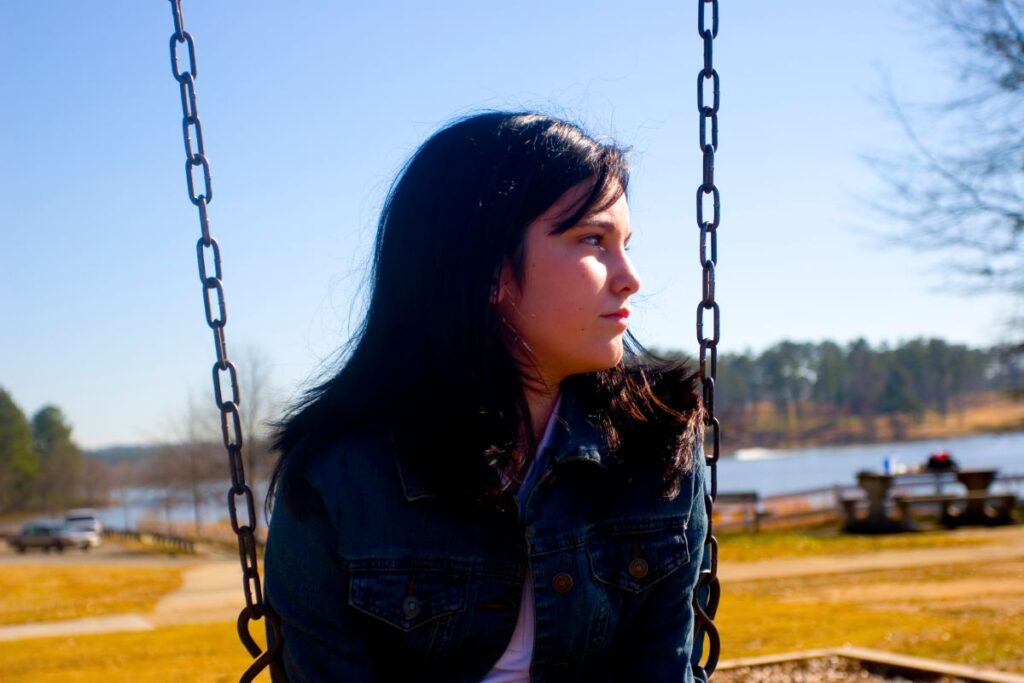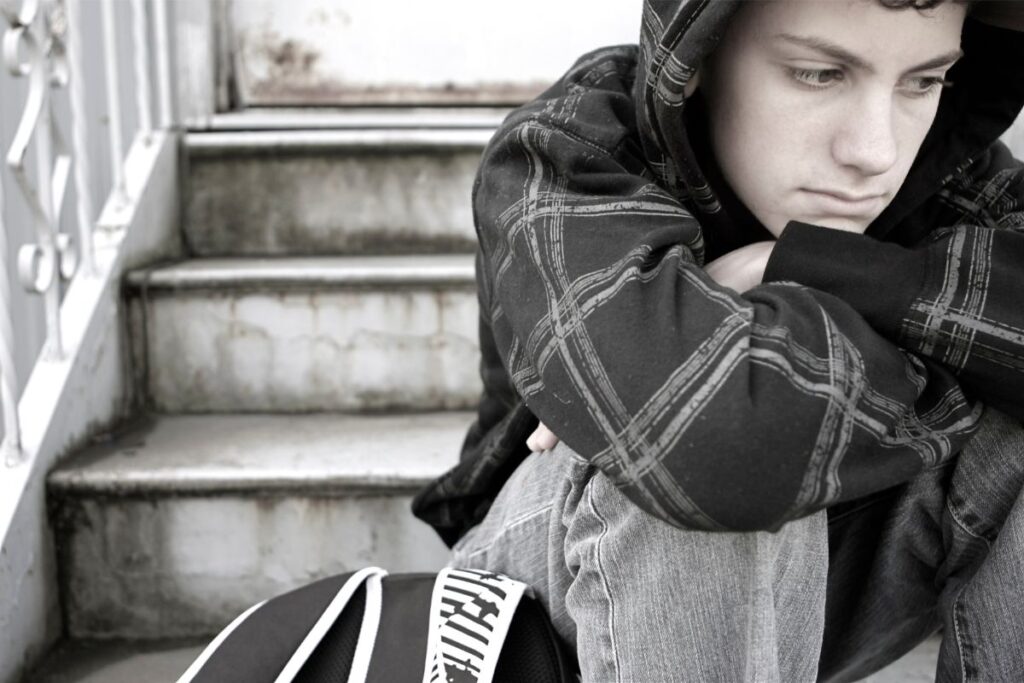Social Anxiety in Teens
Our adolescent treatment center can help your teen with social anxiety disorder.
Contact Hillcrest Adolescent Treatment Center today to learn more.
Home » Treatment for Teens » Teen Anxiety Treatment » Social Anxiety Disorder
Social Anxiety in Teens
Our adolescent treatment center can help your teen with social anxiety disorder.
Contact Hillcrest Adolescent Treatment Center today to learn more.

Many teenagers feel nervous in social situations, but for some, this fear becomes overwhelming and interferes with daily life. Social anxiety in teens is more than just shyness—it’s an intense fear of being judged, embarrassed, or rejected in social settings. It can make simple activities, like speaking in class, attending social events, or even making eye contact, feel impossible. Left untreated, social anxiety can affect school performance, friendships, and emotional well-being.
At Hillcrest Adolescent Treatment Center, we understand how difficult social anxiety can be—for both teens and their families. Our specialized inpatient programs provide a safe and structured environment where teens can gain confidence, learn coping strategies, and develop the skills they need to navigate social situations with greater ease. With the right support, social anxiety doesn’t have to control your teen’s life.
If your teen is struggling with social anxiety, help is available. Contact Hillcrest Adolescent Treatment Center today to learn how our evidence-based anxiety programs and mental health treatment can empower your teen to overcome fear and build a brighter future.
What is Social Anxiety?
Social anxiety, also known as social phobia, is characterized by a persistent fear of social or performance situations where embarrassment may occur. Individuals with social anxiety disorder (SAD) fear negative evaluation, leading to avoidance of social interactions or enduring them with significant distress. In teenagers, this fear often centers around activities such as speaking in class, attending social gatherings, or initiating conversations with peers.
The onset of social anxiety typically occurs during adolescence, coinciding with increased social awareness and peer interactions. Without appropriate intervention, social anxiety can lead to isolation, academic challenges, and the development of additional mental health issues.
Signs and Symptoms a Teen is Struggling with Social Anxiety
If you’re wondering whether your teen may be struggling with social anxiety, there are several key signs to watch for. While it’s natural for adolescents to feel nervous in certain social situations, persistent fear and avoidance may indicate a deeper issue.
Here are some common signs of social anxiety in teens:
- Fear of being judged or embarrassed in social settings
- Excessive self-criticism or replaying social interactions in their mind
- Difficulty speaking to peers, teachers, or other authority figures
- Feeling highly uncomfortable or self-conscious when meeting new people
- Worrying excessively before social events or public activities
- Avoiding crowded places, group activities, or situations that require interaction
- Struggling to make or maintain friendships
- Experiencing physical symptoms like sweating, trembling, nausea, or a racing heartbeat in social settings
It’s important to note that almost everyone experiences some level of social anxiety at different points in life. In fact, anxiety is a natural response to stress and can sometimes help us perform better in challenging situations.
However, when these fears become overwhelming—interfering with school, friendships, or daily activities—it may indicate a more serious issue known as functional impairment. This occurs when anxiety no longer serves a helpful purpose but instead disrupts a person’s ability to engage fully in life.
Take Our Anxiety Test for Teens
This thoughtfully designed assessment guides you through common behavioral patterns and emotional responses that might indicate an anxiety disorder, distinguishing between typical teenage stress and more persistent anxiety symptoms.
Teenage Social Anxiety Statistics
Approximately 9.1% of adolescents experience social anxiety disorder, with 1.3% facing severe impairment that significantly disrupts daily life. Research also shows that social anxiety is more common in teen girls (11.2%) than in teen boys (7.0%). These statistics are based on criteria from the Diagnostic and Statistical Manual of Mental Disorders, Fourth Edition (DSM-IV).
Numerous factors contribute to the development of social anxiety in teens. One factor is an increase in cyberbullying. In 2023, approximately 26.5% of U.S. teens reported experiencing cyberbullying within the past 30 days, reflecting a steady increase from previous years.
Cyberbullying has led to increased school absenteeism, with 19.2% of American teenagers reporting missing school days due to online harassment in 2023, nearly doubling from 10.3% in 2016. Female teens are more likely to experience cyberbullying, with 28.6% reporting incidents in the past month, compared to 24.2% of male teens.
Understanding the prevalence of social anxiety in adolescents underscores the importance of prompt intervention. Without professional treatment, associated symptoms can worsen over time.
Teenage Social Anxiety Statistics
Approximately 9.1% of adolescents experience social anxiety disorder, with 1.3% facing severe impairment that significantly disrupts daily life. Research also shows that social anxiety is more common in teen girls (11.2%) than in teen boys (7.0%). These statistics are based on criteria from the Diagnostic and Statistical Manual of Mental Disorders, Fourth Edition (DSM-IV).
Numerous factors contribute to the development of social anxiety in teens. One factor is an increase in cyberbullying. In 2023, approximately 26.5% of U.S. teens reported experiencing cyberbullying within the past 30 days, reflecting a steady increase from previous years.
Cyberbullying has led to increased school absenteeism, with 19.2% of American teenagers reporting missing school days due to online harassment in 2023, nearly doubling from 10.3% in 2016. Female teens are more likely to experience cyberbullying, with 28.6% reporting incidents in the past month, compared to 24.2% of male teens.
Understanding the prevalence of social anxiety in adolescents underscores the importance of prompt intervention. Without professional treatment, associated symptoms can worsen over time.

Risk Factors of Social Anxiety
Several factors may contribute to the development of social anxiety in teenagers:
- Genetic Predisposition: A family history of anxiety disorders can increase the likelihood of developing social anxiety.
- Environmental Influences: Experiences such as bullying, teasing, or rejection can trigger or exacerbate social anxiety symptoms.
- Personality Traits: Teens who are naturally shy, timid, or introverted may be more susceptible to social anxiety.
- Biological Factors: Imbalances in brain chemicals, such as serotonin, may play a role in anxiety disorders.
- Cultural and Societal Pressures: High expectations and societal pressures can contribute to feelings of inadequacy and fear of judgment.
Recognizing these risk factors can aid in early identification and intervention, potentially mitigating the progression of social anxiety.
Risk Factors of Social Anxiety
Several factors may contribute to the development of social anxiety in teenagers:
- Genetic Predisposition: A family history of anxiety disorders can increase the likelihood of developing social anxiety.
- Environmental Influences: Experiences such as bullying, teasing, or rejection can trigger or exacerbate social anxiety symptoms.
- Personality Traits: Teens who are naturally shy, timid, or introverted may be more susceptible to social anxiety.
- Biological Factors: Imbalances in brain chemicals, such as serotonin, may play a role in anxiety disorders.
- Cultural and Societal Pressures: High expectations and societal pressures can contribute to feelings of inadequacy and fear of judgment.
Recognizing these risk factors can aid in early identification and intervention, potentially mitigating the progression of social anxiety.

Treatment Options for Social Anxiety
Getting the right treatment for social anxiety can make a huge difference in a teen’s confidence, relationships, and overall well-being. At Hillcrest Adolescent Treatment Center, we take a personalized approach to care, ensuring each teen receives the support they need to overcome social anxiety. Our treatment plans include a combination of therapies that focus on mental, emotional, and social growth.
Education
At Hillcrest Adolescent Treatment Center, we recognize that social anxiety can make school-related activities—like speaking in class, group projects, or even attending school—overwhelming. That’s why we integrate academic support into our treatment programs, ensuring that teens can continue their education while working on their mental health.
Our education program provides:
- A structured learning environment that supports academic progress
- One-on-one guidance to help teens manage school-related anxiety
- Customized learning plans tailored to individual needs and learning styles
- Collaboration with teachers and schools to create a supportive transition back to academic life
By balancing mental health treatment with academic success, we help teens build confidence in their abilities, reduce school-related stress, and set them up for long-term success—both socially and academically.
Behavioral Therapy
This approach helps teens recognize negative thought patterns and behaviors that contribute to their anxiety. Through structured techniques, teens gradually face social situations in a supportive environment, building confidence and reducing fear over time.
Psychodynamic Therapy
Social anxiety is sometimes rooted in past experiences or underlying emotional conflicts. Psychodynamic therapy helps teens explore these deeper issues, providing insight into their fears and learning healthier ways to process emotions.
Interpersonal Therapy
Many teens with social anxiety struggle with friendships and communication. Interpersonal therapy focuses on improving social skills, relationship-building, and self-expression, helping teens feel more comfortable interacting with others.
Family Therapy
Family support plays a crucial role in recovery. Through family therapy, parents and caregivers learn how to best support their teen, improve communication, and create a home environment that fosters confidence and emotional safety.
Personal Development
Overcoming social anxiety isn’t just about reducing fear—it’s about helping teens develop self-esteem, independence, and resilience. Our programs include activities that encourage personal growth, goal-setting, and leadership skills.
Recovery Management Therapy
For teens who need long-term support, recovery management therapy provides ongoing guidance to prevent setbacks. This approach helps teens build healthy habits, coping mechanisms, and long-term success strategies to maintain progress.
Expressive Therapy
Creative expression can be a powerful tool for managing anxiety. Through art, music, drama, and writing, teens can explore their emotions in a non-verbal and therapeutic way, helping to reduce stress and improve confidence.
Outdoor Therapy
Spending time in nature has been shown to lower anxiety and improve mood. Our outdoor therapy activities, such as hiking, team-building exercises, and mindfulness in nature, encourage teens to step outside their comfort zones in a relaxed and supportive setting.
Support Your Teen’s Path to Confidence
If social anxiety is holding your teen back, the right support can make all the difference. At Hillcrest Adolescent Treatment Center, we help teens develop confidence, build strong social skills, and overcome fear in a safe and structured environment.
Take the first step today. Contact us to learn more about our specialized treatment programs for social anxiety in teens.
Why Hillcrest Adolescent Treatment Center?
At Hillcrest Adolescent Treatment Center, we are dedicated to providing specialized care for teenagers struggling with social anxiety. Choosing Hillcrest means entrusting your teen’s care to a facility committed to fostering resilience, confidence, and lasting recovery.
Our approach includes:
- Comprehensive Inpatient Programs: Our residential treatment programs offer a structured environment where teens can focus on healing and personal growth.
- Partial Hospitalization Program (PHP): For those requiring intensive support without full-time residency, our PHP offers a balance of therapy and independent living.
- Experienced Multidisciplinary Team: Our team of psychiatrists, therapists, and counselors collaborates to create individualized treatment plans.
- Family Involvement: We emphasize the importance of family participation in the recovery process, offering family therapy sessions and educational resources.
- Holistic Therapies: In addition to traditional therapies, we incorporate expressive arts, outdoor activities, and mindfulness practices to address the diverse needs of our clients.
Take the First Step Toward Healing
If your teen is struggling with social anxiety, don’t wait to seek help. Hillcrest Adolescent Treatment Center is here to provide the compassionate care and expert guidance they need to overcome their challenges.
Contact us today to learn more about our programs or schedule a consultation. Together, we can help your teen find hope, confidence, and a brighter future.












